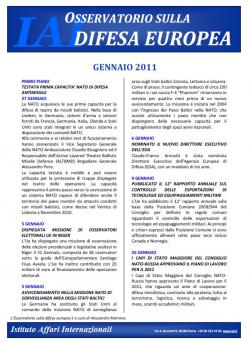Observatory on European defence, May 2004

1 May 2004
EU - Enlargement
On 1 May, ten countries, namely Estonia, Latvia, Lithuania, Poland, Czech Republic, Slovakia, Hungary, Slovenia, Malta and Cyprus acceded to the EU, bringing the number of members to 25 and the total population to 450 million.
The accession of the three former Soviet Baltic republics and Poland has created a Russian enclave, Kaliningrad, encircled by EU countries.
Cyprus accedes to the EU still divided into two parts - the northern part recognized only by Turkey - with borders controlled by the UN. As a result, there is a part of a member state’s territory, the Turkish Cyprus region, in which the acquis communautaire does not hold and on which the military force of a candidate country, Turkey, is present.
The EU enlargement represents an historical success on the one hand, as a projection of stability and enlargement of the European security area, on the other hand, it complicates the EU’s decision-making process and increases the diversities of views in foreign and security policy issues.
The conflictual relation with the States parties to the former Warsaw Pact, and their constant search for US support, both in NATO and bilaterally, could influence the EU’s overall attitude, causing friction with other members, as happened during the Iraqi conflict.
Furthermore the particular situation of Cyprus, although it does not represent a threat for the EU, remains an slight to EU principles and could negatively influence the complicated relations between the EU, Turkey, Greece and the two Cyprus parties.
17-18 May 2004
General Affairs Council, External Relations and Defence -
Military Capabilities, Defence Agency, Terrorism, Non Proliferation, Iraq, Middle East
On 17-18 May, the EU General Affairs and External Relations Councils, following an informal meeting of the European Defence Ministers, discussed a broad agenda and reached several important conclusions on development of the EU’s external policy and defence policy.
Concerning the EU military capabilities, the Council:
- adopted the new Force Catalogue 2004, including the contributions coming from the ten new members of the EU.
- approved the 2010 Headline Goal submitted by the Secretary General, that is the new capabilities objective for 2010 focused on qualitative improvement of available forces, reduction of reaction time, increase in deployment capacity in distant theatres, sustainability in time, and fulfilment of the requirements needed to carry out the whole scope of Petersberg missions, enlarged following the adoption of the European Security Strategy.
- decided to develop the ‘battle groups’ concept, 7-9 units composed of about 1,500 men, ready in 10 days from the political decision Council (expected to be obtained in 5 days); the first groups will be available in 2005, the remaining by 2007.
- promoted the establishment of the European Defence Agency, to be pursued through adoption of a specific Joint Action by the Council on 17-18 June.
- presented the EU take-over of the NATO SFOR mission in Bosnia by the end of the year.
- confirmed the need to tight consultations and collaborations between the EU and NATO.
- urged the set up of the autonomous EU planning and command headquarters.
The Council also dealt with the problem of threats related to the growth of international terrorism and the proliferation of weapons of mass destruction, nuclear in particular, in the framework of the European Union’s Non Proliferation Strategy and the US-led initiative known as Proliferation Security Initiative (PSI). In this regard, the Additional Protocol to the Nuclear Non Proliferation Treaty (NPT) entered into force on 30 April.
The commitment not to develop such armaments is becoming a condition for the adoption of partnership agreements between the EU and Third Countries, as happened in the recent case of Syria.
In the fight against terrorism, meetings were held between European Counter-Terrorism Coordinator de Vries and US authorities with the aim of developing transatlantic cooperation.
The agreement between the EU and the US on the exchange of passenger data was approved, despite some opposition from the European Parliament which considers it damaging to the privacy of citizens.
The Ministers also dealt with two topical issues: the deteriorating situation in Iraq and the development of a Western policy towards the Middle East.
The situation in the field and military developments in Iraq were discussed mostly in the NATO framework, as were the prospects of adopting a new UN Resolution allowing for the transfer of powers to local authorities and the possible enlargement of the stabilization force.
Belgium, France and Germany did not on principle oppose the involvement of NATO in Iraq, in case of a new Resolution, even though they do not wish for this solution and still exclude the involvement of their troops.
The acts of torture committed by the occupation forces on Iraqi prisoners were condemned.
The Middle Eastern policy was discussed by the so-called Quartet (UN, US, EU, Russia) in a meeting on 4 May, and by the High Representative on 25 May. Solana proposed that the EU sends civilian observers to facilitate Israel’s proposed withdraw from Gaza, in the framework of a solution negotiated by the parties.
-
Details
Roma, Istituto affari internazionali, 2004 -
Issue
04/05


